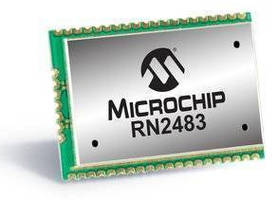Microchip's LoRa® Wireless Module is World's First to Pass LoRa Alliance Certification; Ensures Interoperation of Long-range, low-power IoT Networks

- Stack-on-Board RN2483 named golden-unit reference module for all future certifications; makes it easy to tap the long range and low power of LoRa wireless networks
BANGKOK - Microchip Technology Inc., (NASDAQ: MCHP) a leading provider of microcontroller, mixed-signal, analog and Flash-IP solutions, has announced that its RN2483 LoRa® module is the world's first to pass the LoRa Alliance's LoRaWAN™ Certification Program. The RN2483 module was independently tested by Espotel's accredited test laboratory to meet the functional requirements of the latest LoRaWAN 1.0 protocol specification, for operation in the 868 MHz license-free band. This ensures that designers can quickly and easily integrate their end devices into any LoRaWAN network. The LoRaWAN standard enables low-data-rate Internet of Things (IoT) and Machine-to-Machine (M2M) wireless communication with a range of up to 10 miles, a battery life of 10 years, and the ability to connect millions of wireless sensor nodes to LoRaWAN gateways.
To learn more about Microchip's LoRa products, go to: http://www.microchip.com/LoRa---121715a. And, check out how easy the RN2483 module is to use, at Microchip's Embedded World booth (Hall 1: Booth 1-510).
"The launch of an accredited certification program is a key step toward the LoRa Alliance's mission to standardise an open specification for secure, carrier-grade, low-power wide area networks (LPWAN). We are proud to be the first and only company to have a module certified to the LoRaWAN 1.0 specification," said Steve Caldwell, VP of Microchip's Wireless Product Division and chair of the LoRa Alliance Strategic Committee. "This certification program will provide assurance to end customers that their application-specific end devices will operate on any LoRaWAN network, which is a crucial requirement for the global deployment of the IoT using LPWANs."
"Microchip was well prepared for certification testing, and Microchip's engineers had a very professional and meticulous approach during the test execution," said Jouko Nikula, the product owner of Espotel's LoRaWAN test services. "Espotel will also use Microchip's RN2483 module as a benchmark product when further developing the LoRaWAN certification, interoperability and performance testing in our test and research laboratory."
Before the certification program was launched, Microchip's LoRa development team had performed extensive verification and interoperability tests with all of the major LoRaWAN network infrastructure vendors, and so was already considered to be the golden unit within the LoRaWAN ecosystem. Peter Kaae Thomsen, CTO of the leading LoRa core network provider OrbiWise, confirmed that the RN2483 module has already been adopted as the reference device used for testing their UbiQ Network Solution.
Gartner predicts that there will be 25 billion connected things in use by 2020. While the IoT market is explosively growing, developers are challenged to establish a simple, robust infrastructure with their limited resources. They are demanding a solution that requires a minimum total cost of ownership and is easy to design, with short time to market, great interoperability and nationwide deployment. Microchip's 433/868 MHz RN2483 LoRaWAN module is a European RTTE Directive Assessed Radio Module, accelerating development time while reducing development costs. Additionally, it combines a small module form factor of 17.8 x 26.7 x 3.0 mm with 14 GPIOs, providing the flexibility to connect and control a large number of sensors and actuators while taking up very little space.
The RN2483 module comes with the LoRaWAN protocol stack, so it can easily connect with the established and rapidly expanding LoRa Alliance infrastructure - including both privately managed local area networks (LANs) and telecom-operated public networks - to create Low Power Wide Area Networks (LPWANs) with nationwide coverage. This stack integration also enables the module to be used with any microcontroller that has a UART interface, including hundreds of Microchip's PIC® MCUs. Additionally, the RN2483 features Microchip's simple ASCII command interface for easy configuration and control.
The RN2483 module resolves the age-old wireless developer's dilemma, where they had to choose between longer range and lower power consumption. By employing LoRa technology, designers can now maximise both; while reducing the cost of additional repeaters. Additionally, the RN2483 provides them with the ability to secure their network communication using AES-128 encryption.
With its scalability, robust communication, mobility and the ability to operate in harsh outdoor environments, the RN2483 is well suited for a broad range of low-data-rate wireless monitoring and control designs. Example IoT and M2M applications include: smart cities (street lights, parking, traffic sensors), energy measurement (electricity/water/gas smart meters), and industrial/commercial/home automation (HVAC controls, smart appliances, security systems, lighting).
Availability and development support
Microchip's RN2483 is available now for volume production. Samples are also available, by contacting Microchip's field sales force. The RN2483 LoRa Technology PICtail™/PICtail Plus Daughter Board (part # RN-2483-PICTAIL) and 868 MHz RN2483 LoRa Technology Mote (part # DM164138) development boards are also available now. For additional information, contact any Microchip sales representative or visit Microchip's website at http://www.microchip.com/LoRa---121715a.
Resources
High-res images available through Flickr or editorial contact (feel free to publish):
   -- Module photo: http://www.microchip.com/Module-121715a
   -- Block diagram: http://www.microchip.com/Diagram-121715a
Follow Microchip
   -- RSS Feed for Microchip product news:
       http://www.microchip.com/RSS-121715a
   -- Twitter: http://www.microchip.com/Twitter-121715a
   -- Facebook: http://www.microchip.com/Facebook-121715a
   -- YouTube: http://www.microchip.com/YouTube-121715a
About Espotel
Espotel (http://www.espotel.com) is a leading provider of development and test services for embedded systems and industrial internet applications. Position at the edge of new technology with leading technology partners and strong roots in the development of electronic devices and systems has created Espotel a wide international customer base. Espotel has offices in Finland, Poland and Sweden. With a turnover of 25 million euros in 2014, the company is showing continuous growth and profitability, enabling the development of technological expertise and excellence at customer service.
About Microchip Technology
Microchip Technology Inc. (NASDAQ: MCHP) is a leading provider of microcontroller, mixed-signal, analog and Flash-IP solutions, providing low-risk product development, lower total system cost and faster time to market for thousands of diverse customer applications worldwide. Headquartered in Chandler, Arizona, Microchip offers outstanding technical support along with dependable delivery and quality. For more information, visit the Microchip website at http://www.microchip.com/Homepage-121715a.
Note: The Microchip name and logo, and PIC are registered trademarks of Microchip Technology Incorporated in the U.S.A. and other countries. PICtail is a trademark of Microchip Technology Incorporated in the U.S.A. and other countries. All other trademarks mentioned herein are the property of their respective companies.
For more information, please contact:
Microchip
Daphne Yuen
+852-2943-5115
email: daphne.yuen@microchip.com
SourceÂ
Microchip Technology
Web Site: http://www.microchip.com/Homepage-121715a




